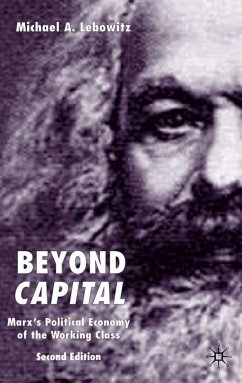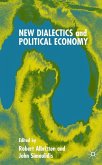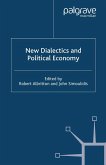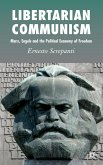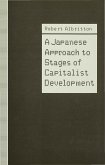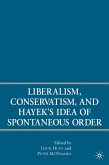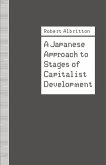Michael Lebowitz's "Beyond Capital" addresses one of the great debates amongst Marxian scholars, that of the implications of Marx's failure to write his intended book on wage-labour, a topic that was never developed in "Das Kapital".
Winner of The Deutscher Memorial Prize 2004. In a completely reworked edition of his classic (1991) volume, Michael A. Lebowitz explores the implications of the book on wage-labour that Marx originally intended to write. Focusing upon critical assumptions in Capital that were to be removed in Wage-Labour and upon Marx's methodology, Lebowitz stresses the one-sidedness of Marx's Capital and argues that the side of the workers, their goals and their struggles in capitalism have been ignored by a monolithic Marxism characterized by determinism, reductionism and a silence on human experience.
Winner of The Deutscher Memorial Prize 2004. In a completely reworked edition of his classic (1991) volume, Michael A. Lebowitz explores the implications of the book on wage-labour that Marx originally intended to write. Focusing upon critical assumptions in Capital that were to be removed in Wage-Labour and upon Marx's methodology, Lebowitz stresses the one-sidedness of Marx's Capital and argues that the side of the workers, their goals and their struggles in capitalism have been ignored by a monolithic Marxism characterized by determinism, reductionism and a silence on human experience.
'Lebowitz's argument about the inadequacy of Marx's formulation of relative surplus value is a major contribution to Marxian thought.' - Tony Smith, Philosophy, Iowa State
'This book offers an outstanding contribution to Marxist theory. It is innovative, clear-sighted and thought-provoking. Lebowitz is one of the most original thinkers of our age. Beyond Capital should be read by all those with an interest in Marx's analysis of capitalism.' - Alfredo Saad-Filho, Political Economy, School of Oriental and Asian Studies, UK
Reviews of the first edition:
'...a rigourous, insightful and pleasantly readable book on the theme of class subjectivity, and this should give to any Marxist - especially any Marxist 'political economist' - sufficient reason for reading it.' - Massimo de Angelis, Capital & Class
'If understanding anything involves understanding its limits, then anyone who wants to understand Marxism in general and Capital in particular should read Lebowitz's book.' - James Devine, Monthly Review
'The major theoretical achievement of the book is the construction and analysis of [Marx's] missing book on wage labour.' - David Houston, Review of Radical Political Economics
'Revised and expanded since the first edition of 1992, this study plays two important roles: it is an excellent introduction to fundamental concepts in Marx, with especially skillful exegesis of Marx's texts and interweaving of quotations, and thus is a significant addition to the corpus of materials for classroom use.' - David Laibman, Editor of Science & Society
'Beyond Capital stands out because it does in fact 'ruthlessly' address the 'durability of capital and the passivity of the working class'. Despite its own limited theorization of working class politics even in this second edition, the book stands an exciting and major contribution to the renewal of Marxism, and the revival of socialist politics. It includes much that is new, but equally important, it takes concepts and ideas that have been loosely applied before and, reminding us why rigour matters, provides them with a more solid foundation, a theoretical home. It touches an impressive number of the issues critical to moving 'beyond capital(ism)' and where it does not fully resolve them, it leaves us with an ambitious and worthy research agenda. Above all, it challenges a new generation to not only escape the fundamentalism that history has deflated, but also free itself of its false opposition, an eclecticism which does not have the theoretical legs to sustain a movement aspiring to take on capital, and go beyond it.' - Leo Panitch and Sam Gindin, Bringing the Working Class In: Mike Lebowitz's Beyond Capital
'This book offers an outstanding contribution to Marxist theory. It is innovative, clear-sighted and thought-provoking. Lebowitz is one of the most original thinkers of our age. Beyond Capital should be read by all those with an interest in Marx's analysis of capitalism.' - Alfredo Saad-Filho, Political Economy, School of Oriental and Asian Studies, UK
Reviews of the first edition:
'...a rigourous, insightful and pleasantly readable book on the theme of class subjectivity, and this should give to any Marxist - especially any Marxist 'political economist' - sufficient reason for reading it.' - Massimo de Angelis, Capital & Class
'If understanding anything involves understanding its limits, then anyone who wants to understand Marxism in general and Capital in particular should read Lebowitz's book.' - James Devine, Monthly Review
'The major theoretical achievement of the book is the construction and analysis of [Marx's] missing book on wage labour.' - David Houston, Review of Radical Political Economics
'Revised and expanded since the first edition of 1992, this study plays two important roles: it is an excellent introduction to fundamental concepts in Marx, with especially skillful exegesis of Marx's texts and interweaving of quotations, and thus is a significant addition to the corpus of materials for classroom use.' - David Laibman, Editor of Science & Society
'Beyond Capital stands out because it does in fact 'ruthlessly' address the 'durability of capital and the passivity of the working class'. Despite its own limited theorization of working class politics even in this second edition, the book stands an exciting and major contribution to the renewal of Marxism, and the revival of socialist politics. It includes much that is new, but equally important, it takes concepts and ideas that have been loosely applied before and, reminding us why rigour matters, provides them with a more solid foundation, a theoretical home. It touches an impressive number of the issues critical to moving 'beyond capital(ism)' and where it does not fully resolve them, it leaves us with an ambitious and worthy research agenda. Above all, it challenges a new generation to not only escape the fundamentalism that history has deflated, but also free itself of its false opposition, an eclecticism which does not have the theoretical legs to sustain a movement aspiring to take on capital, and go beyond it.' - Leo Panitch and Sam Gindin, Bringing the Working Class In: Mike Lebowitz's Beyond Capital

